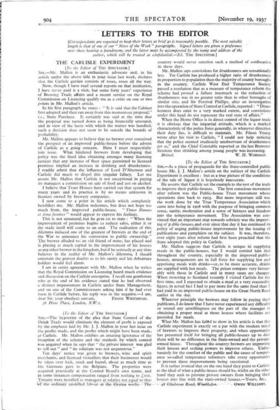[To the Editor of THE SPECTATOR.] Sm,—As a piece of
propaganda for the State-controlled public house Mr. J. J. Mallon's article on the subject of the Carlisle Experiment is excellent : but as a true picture of the conditions of the sale of liquor it is hopelessly inaccurate.
He asserts that Carlisle set the example to the rest of the trade to improve their public-houses. The first conscious movement after reform was the Public-house Trust movement whose operations date back to 1903. But more important still was the work done by the True Temperance Association which came into being in 1908 with the purpose of bringing common sense, sanity, moderation and a sense of fairness and freedom into the temperance movement. The Association was con- vinced that an important step towards sobriety was the improv- ing of p iblic-houses, and ever since that day it has continued its policy of urging public-house improvement by the issuing of publications and pamphlets on the subject. It was, therefore, over eight years after reform had first been preached that the State adopted this policy in Carlisle.
Mr. Mallon suggests that Carlisle is unique iii supplying meals in the publiC-houses, but I would remind him that throughout the country, especially in the improved public- houses, arrangements are in full force for supplying hot and appetising meals with drinks—or, to be more accurate, drinks are supplied with hot meals. The prices compare very favour- ably with those in Carlisle and in many cases are cheaper. When motoring to Scotland recently I visited Carlisle for the first time, and I expected to obtain a meal at a very reasonable figure, in actual fact I had to pay more for Ale same food than I had paid in an improved public-house on the Great North Road earlier in the day.
Whatever prineiple the- brewers may follow in. paying their publicans, I do know that I have never experienced any difficulty or sensed any unwillingness on the part of the manager in obtaining a proper meal at those houses where facilities are provided for meals.
What. Mr. Mallon has failed to show in his article is that this Carlisle experiment is exactly on a par with the modern trend of brewers to improve their property, and -when - opportunity has presented itself for bringing all public-houses up to date there will be no difference in the State-owned and the private- owned house. Throughout the country breivers are improving their houses and seeking powers to improve others. Unfor- tunately for -the comfort of the public and the cause of temper- ance so-called temperance reformers take every opportunity to prevent these _improvements being sanctioned.
It is rather ironical that on the one hand they point to Carlisle as the ideal of what a public-house should be, whilst on the other hand they seek to prevent private owners from bringing their houses into line with the state-owned houses.—Yours, &c.,
-48-Criadsrorre Rcsady.Wimbledort,- - OW -WILLIAMS.
















































































































 Previous page
Previous page